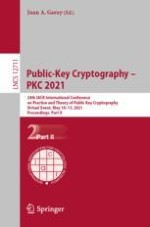2021 | OriginalPaper | Buchkapitel
Multi-party Threshold Private Set Intersection with Sublinear Communication
verfasst von : Saikrishna Badrinarayanan, Peihan Miao, Srinivasan Raghuraman, Peter Rindal
Erschienen in: Public-Key Cryptography – PKC 2021
Aktivieren Sie unsere intelligente Suche, um passende Fachinhalte oder Patente zu finden.
Wählen Sie Textabschnitte aus um mit Künstlicher Intelligenz passenden Patente zu finden. powered by
Markieren Sie Textabschnitte, um KI-gestützt weitere passende Inhalte zu finden. powered by
